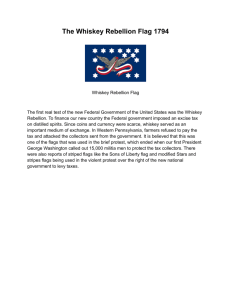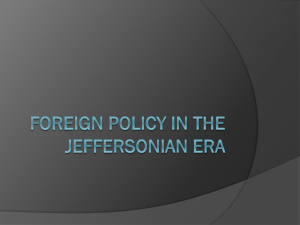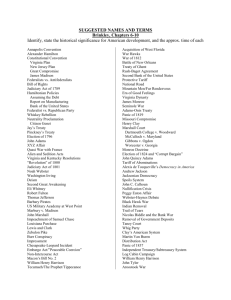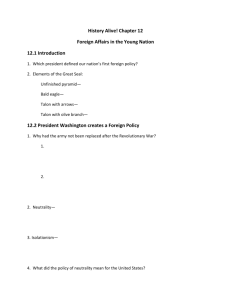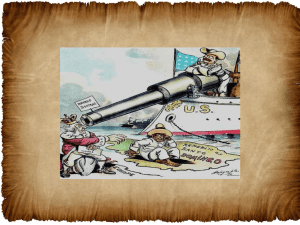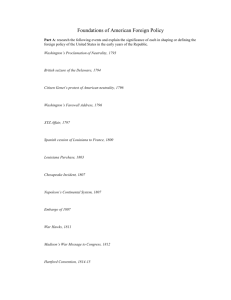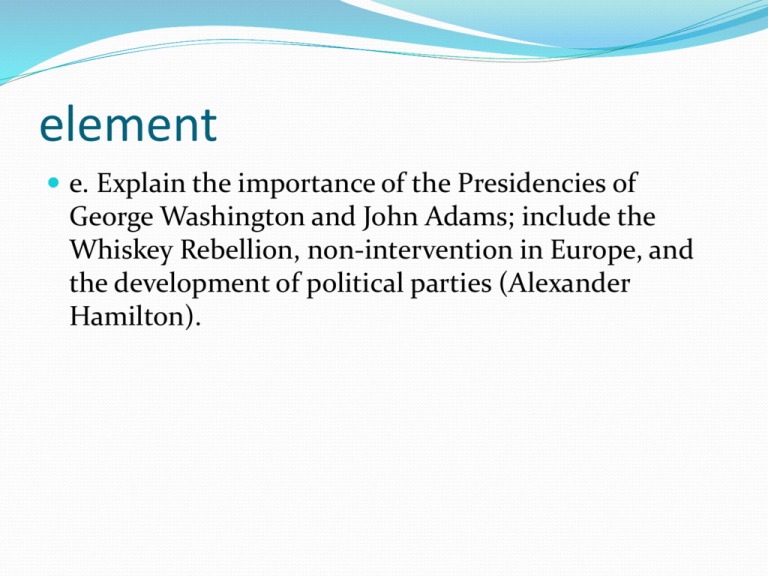
element
e. Explain the importance of the Presidencies of
George Washington and John Adams; include the
Whiskey Rebellion, non-intervention in Europe, and
the development of political parties (Alexander
Hamilton).
Standard 6
e. Explain the importance of the Presidencies of George
Washington and John Adams; include the Whiskey Rebellion, nonintervention in Europe, and the development of political parties
(Alexander Hamilton).
EQ: 1. How did the
certain precedents set by
Washington and Adams
influence the executive
branch?
2. How did Washington
feel about getting
involved in European
conflicts?
3. What was the cause
and impact of the
Whiskey Rebellion?
Learning target
The student will
understand how early
presidents shaped our
nation.
EQ: Heading: Unit 6
1. How would you explain the importance of
Washington's Presidency?
2. How did Washington feel about getting involved in
European conflicts?
2A. Why is that important?
3. What was the Whiskey Rebellion?
3A. Why is the Whiskey Rebellion significant?
4.How would you explain the importance of Adams
presidency?
e. Explain the importance of the Presidencies of George Washington and John Adams; include the Whiskey
Rebellion, non-intervention in Europe, and the development of political parties (Alexander Hamilton).
1. How would you explain the
importance of Washington's
Presidency?
2. How did Washington feel
about getting involved in
European conflicts?
2A. Why is that important?
3. What was the Whiskey
Rebellion?
3A. Why is the Whiskey
Rebellion significant?
4.How would you explain the
importance of Adams
presidency?
••George Washington
•Whiskey Rebellion
•John Adams
•Louisiana Purchase
•Lewis and Clark
•War of 1812
•Monroe Doctrine
*Cabinet
*Two-party system
*Protective tariff
Learning target: The
student will be able to
explain the role early
presidents played in
shaping the nation.
Washington timeline
Jun 15, 1775
Commander in Chief
At the instigation of John Adams, Washington is
appointed commander in chief of the armed forces of
the United Colonies.
Washington Timeline
May 1787
Constitutional Convention
Frustrated by the weakness of the Articles of
Confederation, Washington chairs the Constitutional
Convention to revise them. His signature on the final
document guarantees it will be taken seriously.
Washington timeline
Apr 14, 1789
First President
Secretary of the Congress Charles Thomson informs
Washington that he has just been elected president of
the United States.
Washington timeline
Apr 30, 1789
Washington Inaugural
Washington is inaugurated the nation's first president
in the temporary capital of New York City.
Washington timeline
Feb 13, 1793
Reelection to Second Term
Convinced that the new division between Federalists
and Republicans demands he stay on, Washington
stands for a second term. He is reelected unanimously.
Washington timeline
Sep 19, 1796
Farewell Address
Washington publishes his "Farewell Address" in
Philadelphia's American Daily Advertiser.
element
e. Explain the importance of the Presidencies of
George Washington and John Adams; include the
Whiskey Rebellion, non-intervention in Europe, and
the development of political parties (Alexander
Hamilton).
Learning Target: The student will be able to
describe/explain the key people, events, and policies
that took place under Washington.
EQ: Heading: Unit 6
1. How would you explain the importance of
Washington's Presidency?
2. How did Washington feel about getting involved in
European conflicts?
2A. Why is that important?
3. What was the Whiskey Rebellion?
3A. Why is the Whiskey Rebellion significant?
4.How would you explain the importance of Adams
presidency?
Important events under
Washington
Judiciary Act of 1789
Formation of 2 political parties
Whiskey Rebellion
Conflicts in Europe
George Washington
Only served 2 terms
Hired a cabinet to advise him
Set up departments (Dept. of war Dept. of State, Dept.
of Treasury)
Led the military to put down a rebellion
Established policy of neutrality
Believed America should not form alliances with
foreign countries.
Warned against political parties in his farewell
address.
Importance of Washington’s
presidency
He established important
patterns for future presidents
to follow.
.
Formation of 2 political parties
Different opinions about the government’s power,
taxes, and policies led to the formation of the first 2
political parties.
Alexander Hamilton
Federalist
First secretary of treasury
His party wanted to create a stronger national
government.
Thomas Jefferson
1st secretary of State
“common man”
Favored a limited role by the government.
Anti-Federalist=Republicans=Democratic-Republicans
Wanted the government to abide by a strict
interpretation of the Constitution
EQ
How did Washington feel about getting involved in
European conflicts?
2A. Why is that important?
Importance of Washington’s
presidency(non-intervention)
Washington favored non-intervention in Europe
and avoided siding with France against Great
Britain.
persuaded Britain to forgive many preRevolutionary debts and to drop certain
restrictions on American trade with British
colonies in the Americas.
This ushered in an era of booming trade with
Britain.
It established a policy of neutrality that is still in
effect today
3. What was the Whiskey Rebellion?
3A. Why is the Whiskey Rebellion significant?
Whiskey Rebellion
Alexander Hamilton wanted to raise revenue by taxing
corn whiskey.
This angered farmers who attacked tax collectors
Federal troops sent in to stop rebellion
Significance of Whiskey Rebellion
The new federal government will enforce laws.
Or, The government will protect the U.S. from foreign
or domestic enemies.
Or , The new government quickly put down a rebellion
where the old government was unable to stop Shay’s
Rebellion
Or, The national legislature has the ability to pass and
collect taxes
Or Washington displayed the authority of the
president
George Washington
First U.S. President
Whiskey Rebellion= congress placed a tax on corn
whiskey, and the farmers that were making the
whiskey started a rebellion.
Washington demonstrated that the President would
lead an army against all enemies whether foreign or
domestic.
4.How would you explain the importance of Adams
presidency?
John Adams
1st U.S. Vice-President
Became second president of U.S.
Beat Jefferson in the 1796 election for president.
He was also a federalist.
Lost to Jefferson in the 1800 election
John Adams Presidency
Adams taking office showed that power can exchange
hands between people without a rebellion or violence
He continued policies put in place by Washington
John Adams Presidency
Alien and Sedition Acts- made it harder to become
citizens and punished those who criticized the
government.
Adams wanted to limit those voting for Jefferson and
did not want people criticizing the government.
Sig, thrown out because it was unconstitutional since
it violated ……….
John Adams Presidency
XYZ Affair=France demanded bribes to work out a
peace agreement.
Caused resentment towards France
Sig… Many people criticize the way Adams handled
things.
He becomes unpopular with voters and loses the next
election of 1800 to Jefferson
Alexander Hamilton
Federalist
First secretary of treasury
His party wanted to create a stronger national
government.
Explain the Northwest Ordinance's importance in the westward
migration of Americans, and on slavery, public education, and the
addition of new states.[SSUSH6.a]
[Describe Jefferson's diplomacy in obtaining the Louisiana
Purchase from France and the territory's exploration by Lewis
and Clark.[SSUSH6.b]
EQ
How did the Northwest
Ordinance impact migration,
slavery, public education, and
newly added states?
How did the Louisiana Purchase
impact the nation?
Learning
Target
The student
will be able
to explain
how the
country
began and
continued to
expand out
west.
Thomas Jefferson
1st secretary of State
“common man”
Favored a limited role by the government.
Anti-Federalist=Republicans=Democratic-Republicans
Wanted the government to abide by a strict
interpretation of the Constitution
Alexander Hamilton, James Madison
Anti-federalists judicial branch
Articles of Confederation legislative branch
Baron Charles de Montesquieu, New Jersey Plan
Bill of Rights, reserved powers
checks and balances, Roger Sherman
Constitutional Convention, separation of powers
executive branch, Shay's Rebellion
Federalists, Virginia Plan, Veto
Great Compromise, Three-Fifths Compromise
The Northwest Ordinance
Passed by Congress in 1787
Est. a set of principles & procedures for
statehood, applied first to states carved out of
the Northwest Territory.
Northwest Territory – Wisconsin,
Michigan, Illinois, Ohio, Indiana
Guaranteed civil liberties, est. guidelines for
statehood, encouraged education, & banned
slavery from the entire region.
Thomas Jefferson
Election of 1800
Tied with Aaron Burr for the most electoral votes. The
House decides the election and makes Jefferson
President.
Led to the 12th amendment(vote prez and vp
separately)
Louisiana Purchase
b. Describe Jefferson’s diplomacy in obtaining the
Louisiana Purchase from France and the territory’s
exploration by Lewis and Clark.
Louisiana Purchase
Jefferson wanted to gain control of New Orleans so the
U.S. could have a port city on the Mississippi River
He knew Napoleon needed the Money to finance his
war in Europe.
Louisiana Purchase
Jefferson sent delegates
to France to offer
Napoleon $10 million for
New Orleans
Needing the money and
tired of trying to run
colonies in American
Napoleon offered to sell
the Louisiana Territory
for 3 cents an acre (15
million for all)
Louisiana Purchase
This purchase doubled
the size of the U.S. and
gave the U.S. control of
the Mississippi River
The Lewis & Clark Expedition
Led by Meriwether Lewis & William Clark
They were hired to explore the Louisiana
Territory
Explored the Louisiana Purchase. Created maps of
trails, rivers, and mountain ranges. And described
plants, animals, and people.
Poster Assignment
Create a poster covering the
Northwest Ordinance.
Poster should include the
importance of slavery,
education, and the addition
of new states in western
expansion.
Create a poster covering the
Louisiana Purchase.
The poster should include
Who was the President who
bought it, it was bought from,
explored it
Why did the US want the
Territory?
What did the purchase
accomplish?
When did the Purchase take
place?
What did the explorers
accomplish on their expedition?
Supreme Court rules that a law passed by
Congress was unconstitutional
This establishes Judicial review for the
Supreme Court
Control of the Atlantic trade continued to create
conflict between France & England.
1807 – Congress imposed an embargo, or halt, of
foreign trade, directed against France & Great
Britain.
Caused economic depression in U.S.
American merchant ships were seized at sea by
both the French & British.
British forced many American sailors into
service in the British Royal Navy.
U.S. believed the British were arming Native
Americans.
18, 1812 – Congress
declared war on G.B.
1814 – Signed Treaty of
Ghent.
Gave U.S. a sense of
nationalism, expanded trade, &
westward movement.
June
Britain was enforcing to prevent neutral American
merchants from trading with the French.
British policy of impressment.
Americans suspected the British were giving
military support to Native Americans so they
would fight to keep Americans from settling lands
west of the Appalachian Mountains.
Americans wished to drive the British out of North
America altogether by conquering Canada while
the British army was fighting the French in Europe
Ended all U.S/ Great Britain aggression. “The
last time Britain and the United States wage
war over diplomacy, trade, territory, or any
other kind of dispute.”
America's army and navy were firmly
established.
The U.S. military achievements gave
Americans a sense of national pride.
1819 – U.S. & Spain sign the Adams-Onis Treaty
Also called the Transcontinental Treaty
U.S. gained ownership of Florida, parts of
Alabama & Mississippi from Spain.
Spain retained Texas, while giving up its claims to
the Oregon Territory.
Dec.2, 1823
President James Monroe issued the Monroe Doctrine.
U.S. would not tolerate any additional European
colonies in North America.
Steamboat developed in 1807.
1825 – Erie Canal: connected Lake Erie to the
west with the Hudson River to the east.
USH 6e
c. Explain major reasons for the War of 1812 and the
war’s significance on the development of a national
identity.
EQ: What were the reasons for the War of 1812?
EQ: How did the War of 1812 help develop a national
identity?
War of 1812
Causes
Britain was supplying
native Americans with
weapons.
Britain's use of
impressing American
sailors
Britain's use of blockade
of Europe
Warhawks wanted the
British out of America.
Results
War of 1812
Causes
Britain was supplying
Results
America proved their
native Americans with
weapons.
Britain's use of impressing
American sailors
Britain's use of blockade of
Europe
Americans wished to drive
the British out of North
America altogether by
conquering Canada
independence.
US army and navy
established as a reputable
military.
War of 1812
Causes
Britain was supplying
Results
US army and navy
Native Americans with
weapons.
Britain's use of
impressing American
sailors
Britain's use of blockade
of Europe
Americans wished to
conquer Canada
established as a
reputable military.
End of US and British
hostilities.
Militaries performance
greatly increases
patriotism.
Element and EQ
e. Describe the reasons for and importance of the
Monroe Doctrine.
EQ: What was the purpose of the Monroe Doctrine?
EQ: What is the importance of the Monroe Doctrine?
James Monroe
Monroe Doctrine
Following the end of the Napoleonic Wars, Spain’s
colonial holdings gained their independence. When a
possible Franco-Spanish alliance appeared imminent
in 1823, President James Monroe warned the nations of
Europe not to meddle in the politics of North and
South America.
James Monroe
When a group of European countries planned to help
one another recapture American colonies that had
gained independence, Monroe announced that the
United States would prevent European nations from
interfering with independent American countries
James Monroe
. Further, Monroe said the United States would remain
neutral in wars between European nations and would
not interfere with their American colonies. In
summary, the Monroe Doctrine defined a key aspect of
U.S. foreign policy to which America still holds today.
Colonies
What was the purpose of the
Monroe Doctrine?
To warn European countries about colonizing in
America.
To protect the U.S. from border conflicts with
European countries.
To stop Europeans from causing more conflicts in
America.
France and Spain were trying to gain more land in
America and Monroe believed it would eventually
cause us to go to war against both countries.
EQ: What is the importance of the
Monroe Doctrine?
, the Monroe Doctrine defined a key aspect of U.S.
foreign policy to which America still holds today.
the Monroe Doctrine set a policy of preemptive
strike to protect us from foreign attacks.
It kept/keeps our enemies from creating
colonies/bases close to the U.S.
EQ: Heading: Unit 6
1. How would you explain the importance of Washington's
Presidency?
2. How did Washington feel about getting involved in European
conflicts?
2A. Why is that important?
3. What was the Whiskey Rebellion?
3A. Why is the Whiskey Rebellion significant?
4.How would you explain the importance of Adams presidency?
EQ: What was the purpose of the Monroe Doctrine?
EQ: What is the importance of the Monroe Doctrine?
EQ: What were the reasons for the War of 1812?
EQ: How did the War of 1812 help develop a national identity?
What were the first two political parties?
Which would you be a member of?
Why?
Growth of Cities and Transportation
National Infrastructure (virtual classroom p6)
In this period, many families moved west of the
Appalachian Mountains to claim land in the new
American territories stretching to the Mississippi
River.
Their travel was difficult, taking a week to cross the
distance a car might drive today in a few hours
Growth of Cities and Transportation
National Infrastructure (virtual classroom p6)
. In response, private companies built the young
nation's roads and waterways. These roads were often
turnpikes, or toll roads, which travelers paid a fee to
use.
Growth of Cities and Transportation
National Infrastructure (virtual classroom p6)
In turn, these fees were used to pay for upkeep of the
new roads.
Where roads could not be built, barges were used on
rivers to carry people and goods as long as the rivers
flowed in the same direction as the settlers and
merchants wanted to travel.
Soon a new invention, the steamboat, enabled people
to buy a ticket from private companies that operated
the boats and travel upstream as easily as downstream.
Growth of Cities and Transportation
National Infrastructure (virtual classroom p6)
Lastly, in the wilderness where rivers did not run and
roads could not be built, government leaders joined
businesspeople to build canals or artificial rivers.
These shallow waterways were for barges, not
steamboats, and had pathways alongside where horses
or mules pulled them.
Growth of Cities and Transportation
National Infrastructure (virtual classroom p6)
Erie Canal
The most famous canal built in this era was the Erie
Canal, which connected the Great Lakes to the
Atlantic Ocean.
It was opened in 1825 after eight years of digging by
thousands of laborers, mostly immigrants. It stretches
363 miles from Lake Erie to the Hudson River, which
flows into the Atlantic Ocean at New York City.
Growth of Cities and Transportation
National Infrastructure (virtual classroom p6)
Erie Canal
The Erie Canal served as a turnpike for barges where a
road could not easily be built, and greatly lowered
transportation costs.
This not only opened up western New York and
regions further west to increased settlement, but also
helped unite new regions with the Atlantic states.
Growth of Cities and Transportation
National Infrastructure (virtual classroom p6)
Rise of New York City
Until 1790, New York City was the capital of the United
States.
In the early 1800s, civic development turned this
colonial town into a great economic center established
on a grid of city blocks.
By 1835, the population had grown so large that New
York City outpaced Philadelphia as the largest U.S. city.
Growth of Cities and Transportation
National Infrastructure (virtual classroom p6)
Rise of New York City
Trade grew when the Erie Canal made the city's
harbors the link between European merchants and the
great agricultural markets across the Appalachians
from New York City.
The city was home to the biggest gathering of artisans
and crafts workers in the United States, and its
banking and commercial activities would soon make it
the leading city in all of North America.
Growth of Cities and Transportation
National Infrastructure (virtual classroom p6)
Monroe Doctrine
In 1823, President James Monroe warned the nations of
Europe not to meddle in the politics of North and
South America.
When a group of European countries planned to help
each other recapture American colonies that had
gained independence, Monroe announced that the
United States would prevent European nations from
interfering with independent American countries.
Growth of Cities and Transportation
National Infrastructure (virtual classroom p6)
Monroe Doctrine
Further, Monroe said the United States would remain
neutral in wars between European nations and their
American colonies, but, if battles took place in the
New World, the United States would view such battles
as hostile actions against the United States.
In summary, the Monroe Doctrine defined an aspect
of U.S. foreign policy to which America still holds
today.
Growth of Cities and Transportation
National Infrastructure (virtual classroom p6)
e. Explain the importance of the Presidencies of
George Washington and John Adams; include the
Whiskey Rebellion, non-intervention in Europe, and
the development of political parties (Alexander
Hamilton).
Federalist vs. Republicans, cont.
a. Explain the Northwest Ordinance’s importance in
the westward migration of Americans, and on slavery,
public education, and the addition of new states.
b. Describe Jefferson’s diplomacy in obtaining the
Louisiana Purchase from France and the territory’s
exploration by Lewis and Clark.
c. Explain major reasons for the War of 1812 and the
war’s significance on the development of a national
identity.
d. Describe the construction of the Erie Canal, the rise
of New York City, and the development of the nation’s
infrastructure.
e. Describe the reasons for and importance of the
Monroe Doctrine.

